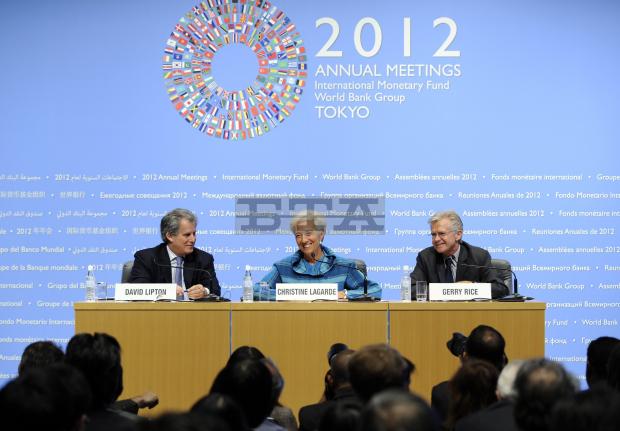The annual conference of the International Monetary Fund and the World Bank in Tokyo, Japan, is expected to find solutions to the crisis in the Eurozone, check the downturn of the global economy and assist developing countries.
The world public is hoping the meeting can find a way to
restore the battered world economy. But tensions in some bilateral relations
could be hindering the success of this conference. 
The IMF/WB annual conference and its sideline meetings are the biggest of the world’s financial, economic and banking leaders. Since the global economic crisis of 2008, the IMF has played a crucial role in addressing financial issues.
In the context of a worsening world economy, the conference gives world financial leaders an opportunity to work out a way to restore the global economy, adjust policies of developing countries, and cope with the European public debt crisis, which has spread beyond the region and hurt newly emerging economies.
Prior to the conference, China announced that its Finance Minister and Bank Governor would not attend the meetings but would send their deputies instead. This surprising decision reflects the currently strained relations between China and Japan, which are now producing widening ripples. The China-Japan economic relationship is one of the key relationships in the world economic structure.
Prior to the conference, IMF General Director Christine Lagarde called on the world’s second and third largest economies to focus on global issues rather than their territorial disputes. The IMF leader stressed that the global economy really needs both economies’ full participation. Neither country has shown any inclination toward cooperation.
Meanwhile, just as the conference was opening, the US and China faced off in a trade dispute after Washington described two leading Chinese telecommunications groups Huawei and ZTE as national security threats. According to a report by the US House Intelligence Committee, Beijing might have used these two firms to spy economically and militarily and to plan cyber attacks against Washington.
Beijing rejected the allegations saying the report, based on speculation and misinformation, aimed to obstruct Chinese businesses, which are operating normally and legally in the US.
The dispute arose two weeks after the US sued China before the World Trade Organization for subsidizing prices of exported automobiles and accessories while China sued the US for excessive tariffs on imported Chinese products. This is one of ten suits against China the US has filed in the last two years and is part of President Barak Obama’s efforts to reduce the US trade deficit with China.
Looking at Europe, analysts have found few optimistic signs. Efforts to reduce deficits and increase liquidity through national stimulus packages have not been effective. Implementing austerity measures to reduce deficits, which requires cutting social welfare programs and assistance for the poor, hasn’t worked either.
The public is now hoping the European Stabilization Mechanism worth US$650 billion announced by the Eurozone on October 10 will get the region out of its current mess. It’s crucial for Europe to reach a consensus on tax and public spending policies and implement measures to merge the banking system in the region.
The IMF has lowered its world economic growth forecast from 3.5 percent to 3.3 percent this year and from 3.9 percent to 3.6 percent next year. The recovery of the global economy depends on the policies of the major economic powers as well as their relations.
VOV5/VOV online


























